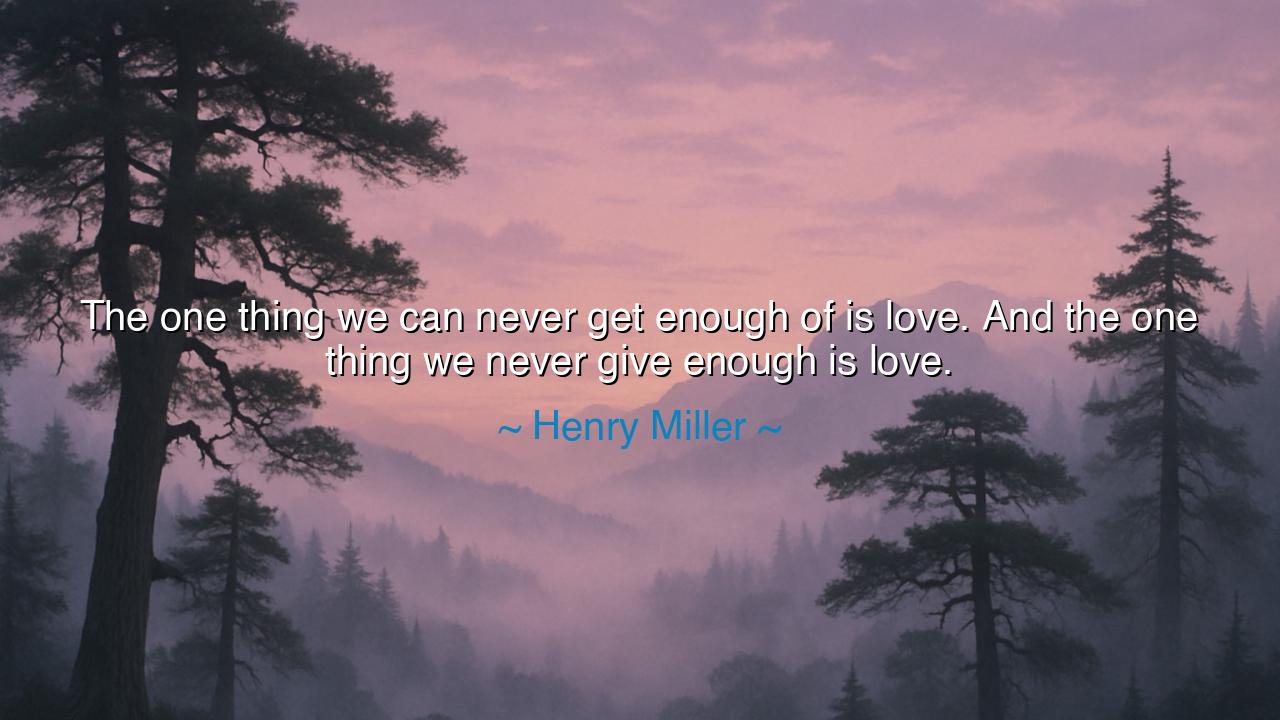
The one thing we can never get enough of is love. And the one
The one thing we can never get enough of is love. And the one thing we never give enough is love.






When Henry Miller wrote, “The one thing we can never get enough of is love. And the one thing we never give enough is love,” he laid bare the eternal hunger and contradiction of the human heart. Every age, every soul, every life has known this truth: that love is both the greatest need and the greatest neglect of humankind. We crave it as we crave breath — yet often fail to give it as freely as we desire to receive it. In these few words, Miller exposed not a flaw in love itself, but in the way we guard it, ration it, and forget that it multiplies only when shared.
Miller, known for his raw explorations of human passion and existence, spoke not as a philosopher detached from life, but as a man who had tasted its fullness — its ecstasy and its loneliness. He saw that love is the soul’s sustenance, the one thing that no wealth, power, or intellect can replace. Men build empires to be admired, compose symphonies to be remembered, and chase pleasure to feel alive — yet all these pursuits return to the same silent yearning: to be loved and to love in return. Still, for all our longing, we hesitate to offer love unconditionally, fearing rejection, betrayal, or loss.
The ancients understood this paradox. They taught that love is not a possession but a flow, a river that stagnates when dammed. To withhold love is to starve oneself as surely as one starves another. The poet Rumi wrote, “Your task is not to seek for love, but merely to seek and find all the barriers within yourself that you have built against it.” Henry Miller’s words echo that same timeless cry — that love cannot fill us when our hearts are closed, nor can it sustain us when we give it sparingly. To receive love, one must become love.
Consider the story of St. Francis of Assisi, who gave up riches, family, and comfort to live among the poor. He found in giving — to the sick, the forgotten, the broken — a joy that kings could not buy. People were drawn to him not because he demanded love, but because he radiated it. He understood what Miller meant centuries before the words were written: the more love he poured out, the more the world gave back. In giving, he was filled. In serving, he was loved. Love, he proved, is the only wealth that grows by being spent.
Yet, most of us live as misers of the heart. We say we have no time, no strength, no faith to love more deeply. We wait for others to show kindness first, to prove they deserve our affection. But Miller’s truth pierces through this illusion: we never give enough love, not because we lack it, but because we fear its vulnerability. We mistake love for weakness, when in truth, it is the highest strength — the fire that softens iron and melts pride. Only the courageous can love without condition, for to love without reward is to live like the gods.
In his wisdom, Miller reminds us that love is both our hunger and our harvest. The one who loves deeply will never go without nourishment, for love feeds both the giver and the receiver. Each kind word, each act of forgiveness, each moment of understanding is a seed planted in the soil of eternity. And while the world may not always repay in kind, the heart that gives remains abundant, for love, once released, always finds its way home.
So, let this teaching become your guide: do not wait to be loved — begin by loving. Love your family more gently, your friends more openly, your enemies more bravely. Let your words heal, your silence comfort, your presence bring peace. You will find, as Henry Miller did, that there is no end to love — it cannot be exhausted, only withheld. The more you give, the more it flows through you, like sunlight through a window that no shadow can dim.
Thus, remember always: the great tragedy of mankind is not that we are unloved, but that we love too little. Fill your days with acts of compassion, your speech with tenderness, your heart with gratitude. For love is the only thing we can never get enough of — and the only thing we must never cease to give. In giving love freely, you fulfill the oldest law of life: that what comes from love shall always return to love, multiplied beyond measure.






AAdministratorAdministrator
Welcome, honored guests. Please leave a comment, we will respond soon